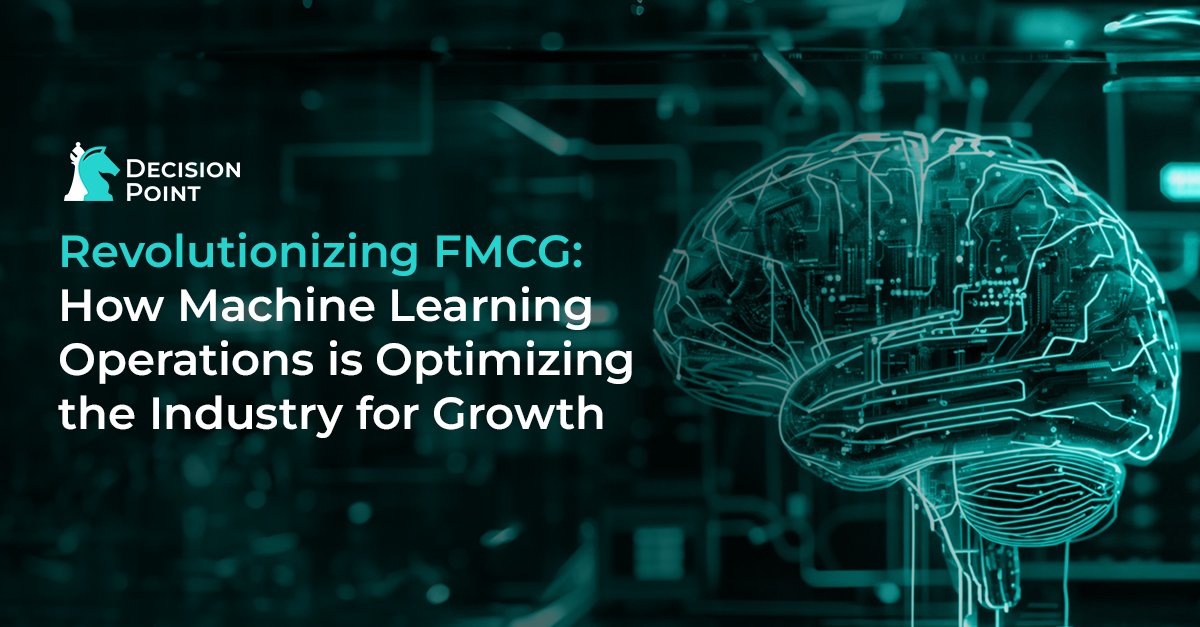Introduction
In 2023, the Global Machine Learning Operations (MLOps) market stood at USD 2.08 billion. By 2033, it’s projected to skyrocket to USD 75.42 billion, growing at a CAGR of 43.2% during the forecast period. With several stakeholders involved as the MLOps market grows rapidly, more companies across industries are recognizing the critical need to efficiently manage their machine learning models on a large scale.
The Fast-Moving Consumer Goods (FMCG) industry is a prime example of an industry that can benefit from scaling MLOps implementation where rapid product turnover and fierce competition are the norm. Leveraging MLOps can significantly enhance decision-making processes and revolutionize multi-market advanced analytics by enabling accurate, reliable, easily maintainable and scalable Machine Learning (ML) based analytics solutions.
Challenges in Maintaining and Scaling MLOps
Deploying Machine Learning models at scale has unique challenges including:
- Inadequate governance and insufficient maintenance of ML models leading to incorrect predictions
- Long lead time for taking ML models into production due to suboptimal processes that do not meet reliability requirements
- Siloed teams which cause lack of collaboration
- Skills shortage and increased cost of continuity
- Longer cycle times delaying valuable impact
Maintaining and scaling MLOps involves many challenges such as managing infrastructure, ensuring data quality and versioning, tracking and deploying model versions, continuous monitoring, facilitating team collaboration, ensuring security and compliance, integrating tools, automating tasks and controlling costs. However, by taking a careful look at the implementation maturity level and deploying the right MLOps framework along with the right solution and cross-functional skillset within the team, these hurdles can be overcome to generate value.
Machine Learning Operations Implementation
Value Generated in a Machine Learning Operations Platform
MLOps enables CPG companies to analyze consumer data, accurately forecast demand, optimize inventory management and boost operational efficiency. This allows brands to quickly respond to evolving trends and cater to customer preferences. Here are a few ways in which MLOps can be leveraged in the FMCG space:
1. Reducing Downtime and Enhancing Operational Efficiency
Potential issues are detected and resolved earlier before they lead to critical failures or disruptions with built-in proactive monitoring when MLOps are integrated. This reduced downtime ensures that business teams continue to operate smoothly without incurring losses caused by service outages. This boosts operational efficiency and enhances production processes by improving automation processes.
2. Increasing Scalability and Faster Time-to-Market
MLOps frameworks support the scaling of machine learning models across different environments, from development to production, and can handle an increasing number of models, data, and users. With MLOps implemented, the time taken for data refresh for existing solutions is decreased. Combining advanced analytics with ML ultimately leads to faster time-to-market for new product launches and product development cycles.
3. Improving Governance and Optimizing Cloud Costs
MLOps platforms enable better governance practices to be followed for data and model governance. MLOps frameworks help optimize the use of computational resources by automating scaling and deployment processes, leading to cost savings in infrastructure and maintenance. By ensuring that only high-performing models are deployed and maintained, MLOps reduces the waste of resources on underperforming models.
4. Improved Model Quality and Consistency
MLOps enforces best practices and standards in model development and deployment, leading to more consistent and reliable model performance across the organization. In addition, MLOps frameworks provide tools for continuous monitoring of model performance and data quality, allowing for the early detection of issues such as model drift or data anomalies.
5. Risk Mitigation
By standardizing processes and providing robust monitoring, MLOps reduces the risk of model failures in production, minimizing disruptions to business operations. Continuous monitoring and automated retraining help mitigate the risk of model drift, ensuring that models remain accurate and effective over time.
6. Autoscaling Machine Learning Applications
With MLOps less resources are required for maintaining and scaling ML applications. Auto-scaling enabled implementation reduces the need for manual intervention and reduces cognitive load on your team. This leads to fewer operational staff requirements.
Rise of Generative AI
With the recent rise of Generative AI (GenAI) capabilities and Large Language Models (LLMs), MLOps processes also need to be adapted to this new class of AI-powered applications. “LLMOps” (MLOps for LLMs) is not that different from traditional MLOps. However, some parts of your MLOps platform and process may require changes, and businesses need to adapt to LLMs and Generative AI capabilities coexisting with Machine Learning Operations. In LLMOps, the focus is on prompt engineering, Retrieval –Augmented Generation or fine-tuning of a model. GenAI and LLM capabilities integrated with MLOps improve CPG processes in terms of efficiency, scalability and risk reduction. Here’s a brief look at some of the benefits:
- Enhances scalability and efficacy of models, especially in dynamically changing markets.
- Organizations can go beyond existing forecasting strategies, adding deeper insights based on evolving trends.
- Accelerates the integration of new insights due to model evolution based on dynamic market changes and reduces the time required for updating and refinement.
- Automatically identifies the necessary data for ingestion and the corresponding code needed to process these inputs leading to seamless prompt processing.
- Allows for continuously evolving models by automating more tasks, new data sets, and new feature additions, and processing & accounting for additions within those models.
- GenAI challenges like biases in output from working on unstructured data are mitigated with MLOps in place via continuous monitoring through an evaluation process that removes inaccurate outputs.
Bottom-line
The integration of MLOps within the FMCG industry will drive unprecedented growth as the MLOps market expands. FMCG companies that embrace advanced analytics and MLOps will be better equipped to stay relevant in a competitive market and achieve sustained success in a rapidly evolving landscape.



